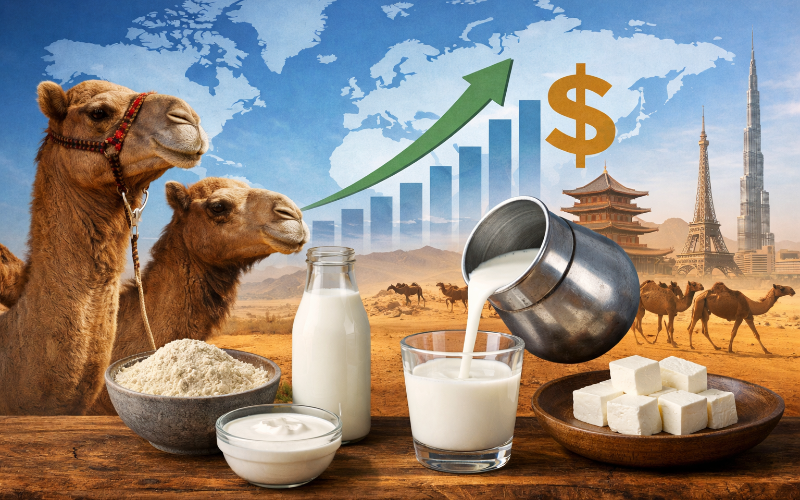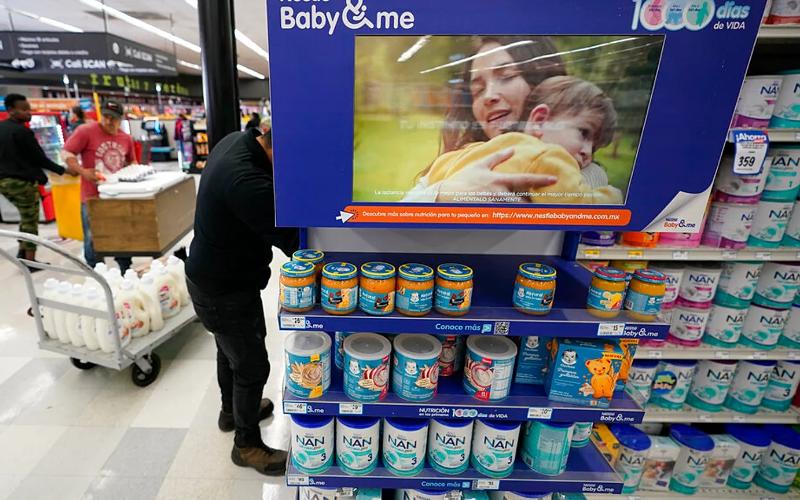Irish Dairy Products Disrupt West African Markets, Forcing Local Farmers Out of Business
Source: DairyNews.today
The influx of cheap European Union (EU) dairy products, particularly from Ireland, is causing significant disruptions in West African markets, forcing many local farmers out of business.

Experts reveal that it is now cheaper for West African countries to import milk than to buy fr om local farmers, a situation exacerbated by the EU's Common Agricultural Policy (CAP).
The CAP, which provides direct aid to European farmers, enables large companies to export dairy products at prices below the cost of production without incurring losses. This system, described as "unequal" by Adrien Trouvadis, a researcher from Group For Research and Technology Exchanges (GRET), has led to an oversupply of cheap EU dairy products, particularly in West Africa. Trouvadis criticizes the CAP, stating that it allows EU dairy products to be "dumped" on the African market at artificially low prices, undermining local production.
In contrast, Olof Gill, agriculture and trade spokesperson for the European Commission, defends the CAP, arguing that its support to EU farmers is "non-trade distorting." However, West African farmers face a different reality. Abimbola, a local farmer, pointed out the stark cost difference, with imported milk costing €0.09 per liter, compared to €0.21 for locally produced milk.
Despite efforts by West African countries to protect their local dairy industries through high tariffs on fresh milk and cheese, fat-filled milk powder (FFMP) and other bulk powders, which are considered necessities for low-income populations, are subject to only a 5% customs duty in many Economic Community of West African States (ECOWAS) member countries. This has led to an increased dependency on imported dairy products, raising concerns about the region's food security and consumer vulnerability to price fluctuations.
Ireland has played a significant role in this dynamic, with over 60% of dairy consumed in Nigeria being imported. In 2023 alone, Irish dairy exports to West Africa were valued at €327.8 million, with €293.5 million attributed to FFMP exports, of which €88.4 million went to Nigeria.
FFMP, a mix of vegetable fat and skimmed milk powder, is used as a milk substitute in Africa, although it is not categorized as milk under EU regulations. Despite this, Irish brands such as Kerrygold Avantage are marketed in Nigeria as "milk," leading to consumer confusion. Many Nigerians are unaware of the difference between FFMP and whole milk powder, a situation exacerbated by the product's packaging and advertising.
The environmental impact of FFMP is also a concern, particularly due to the use of palm oil, which contributes to deforestation and higher carbon emissions. Research from University College Dublin highlights that FFMP, particularly when palm oil is used, has a significantly higher carbon footprint than other dairy products.
In response to the challenges posed by cheap imports, Nigeria has introduced a new National Dairy Policy aimed at achieving self-sufficiency in milk production. The policy includes measures to increase local milk production, establish milk collection centers, and ensure a minimum percentage of locally sourced milk in all dairy products. However, the policy allows for the continued importation of FFMP at the prevailing rate for the next decade, which may lim it the impact of these measures.
Despite a decline in Irish FFMP exports to West Africa, from over €430 million in 2022 to under €300 million last year, the market remains crucial for Irish dairy exporters. Bord Bia, the Irish food board, is working to diversify exports to the region, with a focus on sectors such as beverages.
As Nigeria seeks to reduce its dependency on dairy imports, foreign multinationals operating in the country are being pushed to adapt to the changing landscape, with some beginning to engage in local dairy production. The hope is that these changes will eventually benefit local farmers and reduce the dominance of cheap imported dairy products in the market.
The CAP, which provides direct aid to European farmers, enables large companies to export dairy products at prices below the cost of production without incurring losses. This system, described as "unequal" by Adrien Trouvadis, a researcher from Group For Research and Technology Exchanges (GRET), has led to an oversupply of cheap EU dairy products, particularly in West Africa. Trouvadis criticizes the CAP, stating that it allows EU dairy products to be "dumped" on the African market at artificially low prices, undermining local production.
In contrast, Olof Gill, agriculture and trade spokesperson for the European Commission, defends the CAP, arguing that its support to EU farmers is "non-trade distorting." However, West African farmers face a different reality. Abimbola, a local farmer, pointed out the stark cost difference, with imported milk costing €0.09 per liter, compared to €0.21 for locally produced milk.
Despite efforts by West African countries to protect their local dairy industries through high tariffs on fresh milk and cheese, fat-filled milk powder (FFMP) and other bulk powders, which are considered necessities for low-income populations, are subject to only a 5% customs duty in many Economic Community of West African States (ECOWAS) member countries. This has led to an increased dependency on imported dairy products, raising concerns about the region's food security and consumer vulnerability to price fluctuations.
Ireland has played a significant role in this dynamic, with over 60% of dairy consumed in Nigeria being imported. In 2023 alone, Irish dairy exports to West Africa were valued at €327.8 million, with €293.5 million attributed to FFMP exports, of which €88.4 million went to Nigeria.
FFMP, a mix of vegetable fat and skimmed milk powder, is used as a milk substitute in Africa, although it is not categorized as milk under EU regulations. Despite this, Irish brands such as Kerrygold Avantage are marketed in Nigeria as "milk," leading to consumer confusion. Many Nigerians are unaware of the difference between FFMP and whole milk powder, a situation exacerbated by the product's packaging and advertising.
The environmental impact of FFMP is also a concern, particularly due to the use of palm oil, which contributes to deforestation and higher carbon emissions. Research from University College Dublin highlights that FFMP, particularly when palm oil is used, has a significantly higher carbon footprint than other dairy products.
In response to the challenges posed by cheap imports, Nigeria has introduced a new National Dairy Policy aimed at achieving self-sufficiency in milk production. The policy includes measures to increase local milk production, establish milk collection centers, and ensure a minimum percentage of locally sourced milk in all dairy products. However, the policy allows for the continued importation of FFMP at the prevailing rate for the next decade, which may lim it the impact of these measures.
Despite a decline in Irish FFMP exports to West Africa, from over €430 million in 2022 to under €300 million last year, the market remains crucial for Irish dairy exporters. Bord Bia, the Irish food board, is working to diversify exports to the region, with a focus on sectors such as beverages.
As Nigeria seeks to reduce its dependency on dairy imports, foreign multinationals operating in the country are being pushed to adapt to the changing landscape, with some beginning to engage in local dairy production. The hope is that these changes will eventually benefit local farmers and reduce the dominance of cheap imported dairy products in the market.
Key News of the Week










